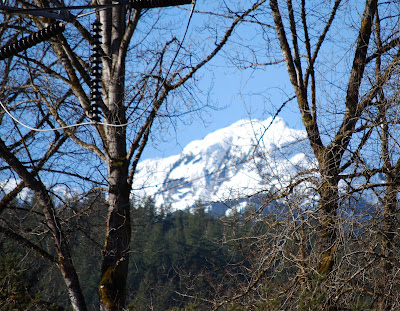
Once again, I took my Grade 6 class to the North Vancouver Outdoor School. We had about 80 kids there, with four teachers, from two schools. The idea is that each teacher develops and delivers a field study in some way related to the outdoor environment. Resident Outdoor School teachers also deliver field studies, so that there are six in all, and the kids rotate through all of them. That means teaching twelve to fifteen kids at a time in two-hour sessions, repeating the study six times. High-school aged counselors accompany us, assisting and eventually taking over the study.
The Outdoor School is a wonderful facility situated in Paradise Valley, beside the Cheakamus River. There are salmon spawning streams running through the property, a salmon hatchery, original cedar stands, and a small farm. Studies are usually related to natural history, and can include Birds of Prey, Salmon Studies, Farm Study, a guided Boardwalk explaining the natural history of the area. I always choose Poetry as my study; I consider it a different way to connect to the outdoors - to be quiet and aware out there, to observe closely, to describe the sensory experiences of being in such a place.
Oh, I get attitude. I get faces, usually from a boy or two. I get mumblings of “I hate poetry.” I ignore all that. I start by drawing the analogy between poetic (or artistic) observation and scientific observation, how everything we know about our world comes from observing it closely. I talk about the senses, and about not making sense. I tell the kids they never have to show their work to anyone, if they don’t want to. (Last year, this brought out the query, from a predictable source: “Can we use the f word?” I said, sure, if you need to.) The liberty of writing for only themselves seems to settle the dissidents.
I hand out clipboards and pencils and a little chapbook for each poet, and we walk. I take them on the Moss Trail, which leads through some wonderful Douglas Fir stands with plenty of open ground for sitting, to a rehabilitated creek beside some boulder-formed caves. We make several stops along the way for writing.

I introduce each poem for writing, one at a time, then send the kids to find a spot to sit (on a sitting pad). The counselor and I stand silently while they write.
I love those moments, kids crouched beneath trees hanging with old man’s beard - moss brilliant in the sun - kids bent in concentration, the glances up as they gather ideas like the Original People gathering roots. I love how everything becomes amplified in those moments: the roosters from the far-off farm, a chickadee’s mating call, a small plane overhead, the wavering patches of sunlight on the litter of the forest floor.

I guide the kids through six poems. The first asks where a poem might hide, if the poem were a creature; look around at all the places some small critter might hide. The second holds a dialogue with some other-than-human living thing, a tree, a bear, a centipede. The third is a shopping list that some wild animal might write. For the fourth, we blindfold the kids, and they sit and let the senses other than sight take over. The fifth - we are beside the creek by this time - is a 360° poem, in which the poet stands in one place and describes scene after scene as she turns around in a full circle. The last poem, the finale, is a stick poem, a short message written on a small stick, sent downstream for some future hiker to find.

I invite students to read their poems if they want to. Some of the poems show surprising insight and sensitivity. Many of them venture into metaphor and “big ideas”. I have no idea how conscious the writers are of what they’ve done, but I’m not concerned with that. My purpose is to open up these kids’ minds to some possibilities they may not have thought of before. Other than the poems kids choose to read, my indication that I’ve been successful is the quiet that blankets the group once we’ve started, the acceptance of the tasks, and the change in attitude apparent as we wrap up.
Does any of it matter to the kids? Who knows? For me, the study is a gift of two hours of quiet introspection, in a magnificent outdoors. I love it, and if one or two of them love it too, that’s a bonus.
.
1 comment:
I remember when you did this last year. Sounds really rewarding. I love the idea of putting a poem on a stick and sending it down river.Hope you are okay, was getting worried about you.
Post a Comment